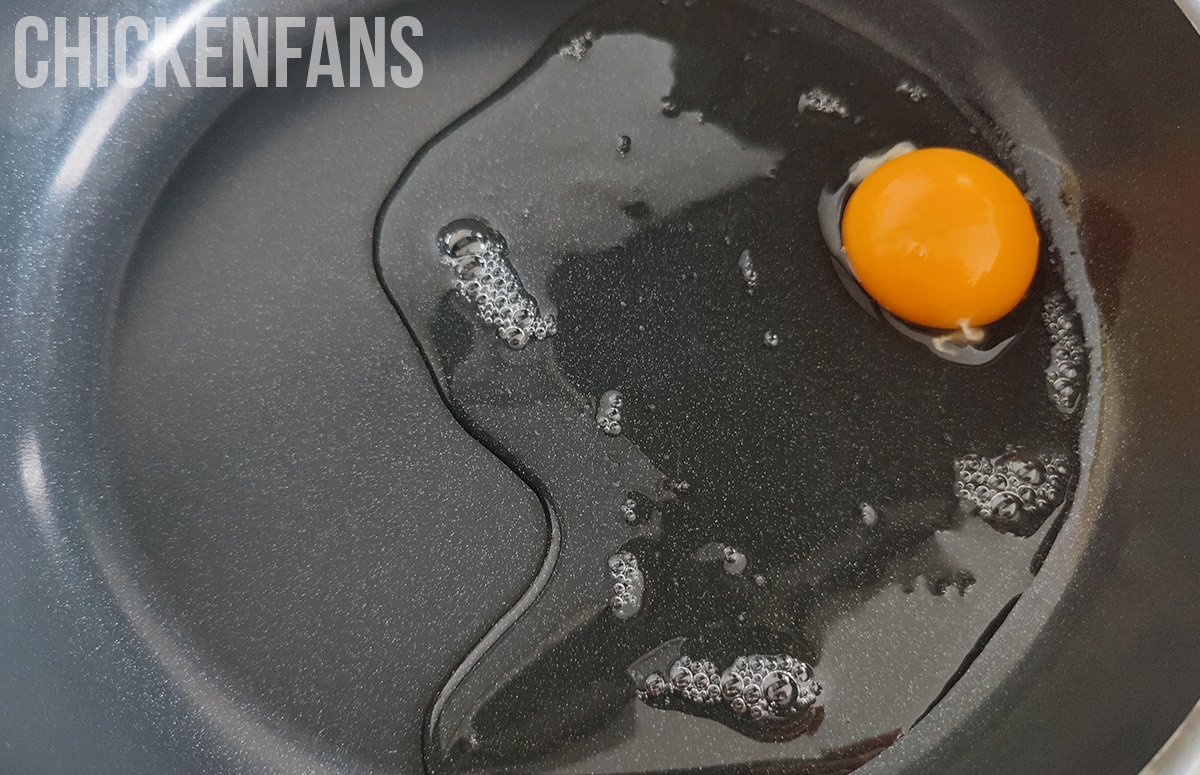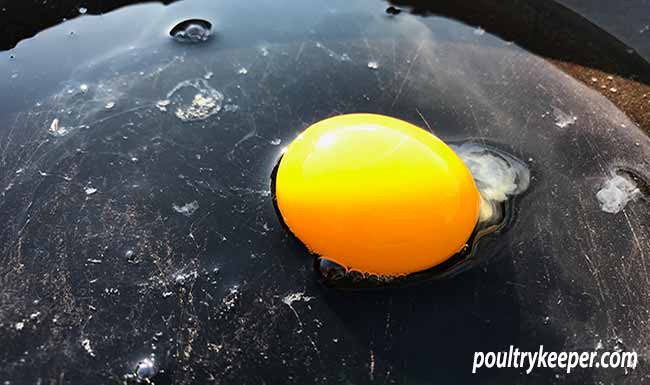Have you ever cracked open a fresh egg from your backyard chickens only to find the whites running all over your pan? Ugh, so frustrating! I’ve been there too, watching in dismay as what should be a perfect breakfast turns into a disappointing, runny mess.
After keeping chickens for years, I’ve discovered that watery egg whites are actually pretty common. The good news? They’re usually safe to eat and there are several ways to fix the problem!
Let’s dive into what causes watery chicken eggs and what you can do about it.
What Exactly Are Watery Egg Whites?
Before we get too deep, let’s clarify what we’re talking about. When we say “watery eggs,” we’re referring to eggs where the white (albumen) is thinner and more runny than usual. In a fresh, high-quality egg, the white should be relatively thick and stay somewhat compact when cracked into a pan.
Watery egg whites don’t necessarily mean bad eggs – they just lack that perfect consistency we’re all hoping for. And if you’re planning to make meringues or other recipes that require whipping egg whites? Good luck with those watery ones!
Are Watery Eggs Safe to Eat?
Yes watery eggs are generally safe to eat as long as
- The shell doesn’t have cracks (which could allow bacteria like Salmonella to enter)
- The egg doesn’t smell bad (give it a quick sniff test)
- The egg is otherwise fresh
The nutritional value and taste typically remain the same, even if the texture is different. So don’t toss those eggs just yet!
7 Common Causes of Watery Chicken Eggs
1. Age of Your Eggs
One of the most common culprits is simply egg age. As eggs get older, the whites naturally become more watery.
If you’re collecting eggs daily but not eating them right away, you might notice the whites getting runnier over time. This is completely normal! The carbon dioxide inside the egg gradually escapes through the shell’s pores, causing the albumen to thin out.
Solution: Use your eggs in order of collection – oldest first, newest last. Try to consume eggs within 2-3 weeks for best quality.
2. Age of Your Chickens
Just like humans show signs of aging, so do our feathered friends! Older hens (especially prolific layers like White Leghorns and Rhode Island Reds) tend to lay eggs with thinner whites compared to younger birds.
This is particularly noticeable in chickens that are 3+ years old. Their reproductive systems have been working hard for years, and the quality of their eggs gradually declines.
Solution: While you can’t stop your chickens from aging, you can add some younger birds to your flock to ensure a mix of egg qualities.
3. High Ammonia Levels in the Coop
Did you know chicken poop contains a lot of ammonia? (Well, duh, right?) But what you might not realize is that when it builds up in your coop, those ammonia fumes can actually affect egg quality!
When chickens are exposed to high levels of ammonia in the air, they can lay eggs with watery whites. This is especially problematic in winter when coops are often closed up tighter for warmth.
Solution: Clean your coop more frequently (possibly up to 3 times a week if you have many birds in a small space) and improve ventilation. Your nose AND your eggs will thank you!
4. Improper Egg Storage
Temperature and humidity matter for egg storage! Too much heat or low humidity can cause eggs to deteriorate faster, resulting in those runny whites we’re trying to avoid.
Solution: Store eggs either at a stable room temperature or in the refrigerator if you live in a very hot area. Once refrigerated, keep them there – fluctuating temperatures speed up deterioration.
5. Chicken Illness
Several diseases can affect egg quality, with infectious bronchitis being one of the most common culprits. This highly contagious respiratory disease can cause hens to lay eggs with watery whites, even after they’ve recovered from the illness.
Solution: If you suspect illness, consult with a vet who specializes in poultry. Even after treatment, be patient – it might take a few weeks for egg quality to return to normal.
6. Nutritional Deficiencies
Your chickens’ diet directly impacts the quality of their eggs. If they’re not getting the right balance of nutrients, it can result in watery egg whites.
Solution: Provide a well-balanced layer feed with appropriate protein levels. Consider supplements like oyster shell for calcium and occasional treats like mealworms for additional protein.
7. Stress Factors
Chickens are sensitive creatures, and stress can affect their egg quality. Factors like extreme temperatures, predator threats, or changes in the flock hierarchy can all contribute to watery eggs.
Solution: Maintain a comfortable, predator-proof environment for your chickens and minimize changes to their routine when possible.
A Quick Comparison: Normal vs. Watery Egg Whites
| Characteristic | Normal Egg White | Watery Egg White |
|---|---|---|
| Consistency | Thick, gelatinous | Thin, runny |
| Behavior when cracked | Stays compact around yolk | Spreads widely in pan |
| Best use | All cooking methods | Better for scrambling than frying |
| Safety | Safe to eat | Safe to eat (if fresh) |
| Whipping capability | Whips well | May not whip well |
Tips for Preventing Watery Egg Whites
While some causes (like hen age) are unavoidable, here are some practical steps you can take to minimize watery egg whites:
- Collect eggs frequently – at least once daily, more often in extreme weather
- Rotate your egg stock – use the first in, first out method
- Clean your coop regularly – aim for at least weekly deep cleans
- Ensure proper ventilation – especially important in winter
- Feed quality layer feed – don’t skimp on nutrition
- Provide plenty of clean water – hydration affects egg quality
- Minimize stress – keep a consistent routine for your flock
When to Be Concerned
While watery eggs are usually safe, sometimes they can signal a problem that needs attention. Be on the lookout if:
- Watery eggs appear suddenly across multiple hens
- Other egg abnormalities occur simultaneously (odd shells, strange colors)
- Your chickens show signs of illness (lethargy, decreased appetite, etc.)
- The eggs have a strange smell
In these cases, it’s worth consulting with a poultry vet to rule out disease or serious nutritional deficiencies.
Final Thoughts
As a chicken keeper, encountering watery eggs is just part of the journey. I remember freaking out the first time I saw super runny whites, worried my whole flock was sick! Now I know better.
Most of the time, watery egg whites are just a minor inconvenience, not a health concern. By understanding the causes and implementing a few simple changes, you can often improve the quality of your eggs.
And remember – even if some of your eggs have watery whites, they’re still FAR superior to store-bought eggs in terms of freshness and flavor! The occasional runny white is a small price to pay for the joy of collecting eggs from your own backyard flock.
Have you dealt with watery egg whites from your chickens? What solutions worked best for you? I’d love to hear about your experiences in the comments below!

Watery egg whites are safe to eat
Remember, watery egg whites are perfectly normal for older hens to lay and can be safely eaten, providing they are fresh and shells have no cracks in them (which can let bacteria in).
Most of our older hens in a back garden set up will lay eggs well below the value of 60 Haugh that is acceptable for shops.
Problems with watery egg whites
Watery egg whites can cause more misshaped, wrinkled egg shells and if combined with thinner shells, can cause eggs to break easily leading to vices such as egg eating because eggs break more easily.

You can test an egg for watery white, simply by cracking an egg onto a flat surface such as a plate and seeing how much it spreads out across the plate (or frying pan in the picture above).
There is actually a measure of how watery eggs are where the height of the white and the weight of the egg are measured to give a measurement in Haugh between 0 and 100. The lower the Haugh value is, the more watery the white is.
This measurement is only normally used in commercial egg production and the minimum value of 60 is usually required when eggs are sold in the shops.
Tips on how to fix watery eggs.
FAQ
Why are my chickens laying liquid eggs?
You have a chicken laying liquid eggs there is obviously something wrong with the hen. There are a few potential reasons for a hen laying an egg without a shell, or at least not a fully formed shell. The number one cause is calcium deficiency.
Why do chickens lay watery egg whites?
Illness: Some diseases like infectious bronchitis and egg drop syndrome can cause watery egg whites. These causes are the most common reasons to have chickens that lay watery egg whites. But there are other, less common, causes that deserve mention too. Genetics: Some strains or breeds produce eggs with a thinner egg white than others.
Why are my Egg whites watery?
Under usual circumstances, the whites of fresh eggs are thick and robust. But occasionally, you might come across watery egg whites. This can be caused by numerous factors, like egg age, hen’s age, illnesses, or environmental conditions. Let’s dive deeper into why egg whites can be watery and whether these eggs are safe to eat.
Why do my birds have watery eggs?
If she has access to pasture, the yolks of her eggs will still be that beautiful deep golden, and they will still taste delicious despite being a bit thinner. There are also some illnesses that cause watery whites like egg drop syndrome and infectious bronchitis. If you suspect your birds are ill, you should get them checked out by a licensed vet.
Why are my chickens white?
High ammonia levels in the coop can cause watery whites, too, as can high temperatures. These are other reasons factory farmed eggs are usually not very good: the conditions chickens experience in places like that are just not conducive to quality eggs.
Can chickens eat watery eggs?
In addition to laying watery eggs, some birds also lay eggs with mishaps, wrinkles, or thin shells. As long as the shell is not cracked, and the egg does not smell, it is probably safe to eat. It is not uncommon for our chickens to lay watery eggs.
What does it mean when eggs are watery?
Are eggs still good if they are watery?
It’s fine if the yolk is runny as long as the white is fully cooked. By the time the white is cooked, the yolk should be hot enough to kill salmonella bacteria even though it’s not cooked enough to change consistency.
How to fix watery eggs?
To fix watery scrambled eggs, cook them a little longer to evaporate moisture, use a nonstick pan with fat, or add a thickener like cornstarch or cheese. You can also prevent them from becoming watery by not adding too much liquid (like milk), using fresher eggs, and salting them at the end of the cooking process instead of the beginning.
Why are my chickens egg yolks runny?
